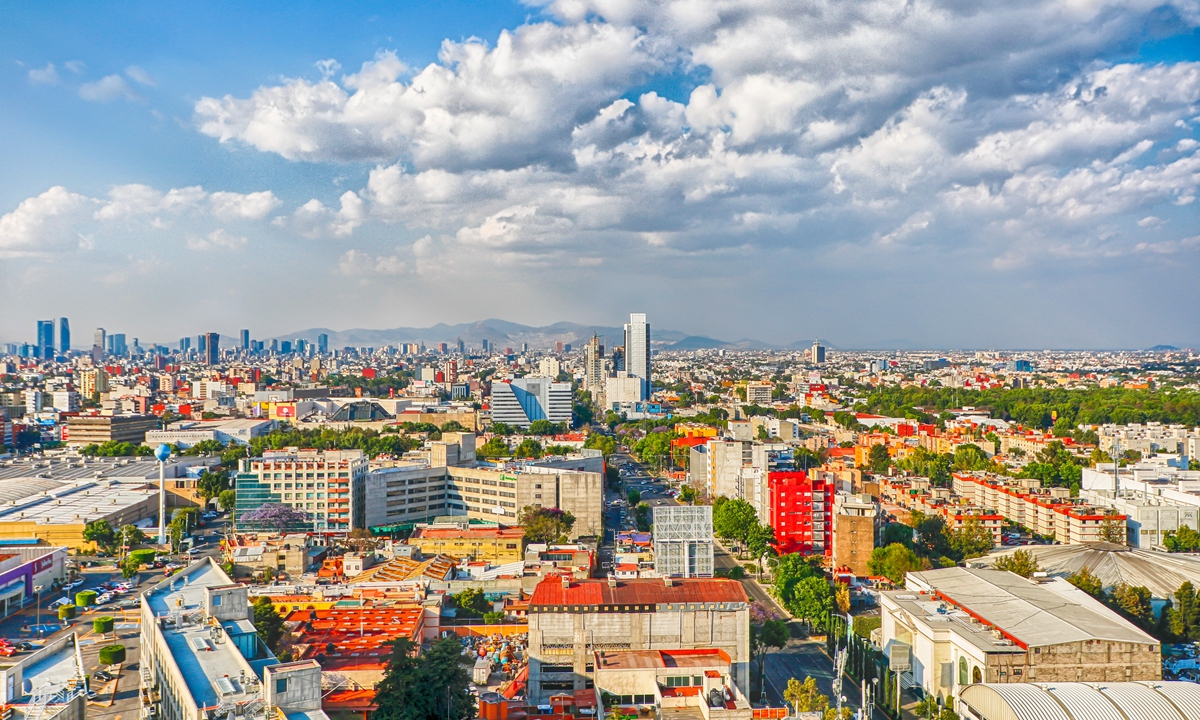
The view of Mexico City Photo: VCG
Mexico-China economic and trade cooperation has been broadening from infrastructure projects and traditional industries to burgeoning new-energy sectors, representing a win-win scenario for bilateral relations, former Mexican ambassador to China José Luis Bernal told the Global Times in an exclusive interview over the weekend.
"The diversified business potential will fuel bilateral trade growth and contribute to the global green transition," Bernal told the Global Times during the eighth Global Think Tank Summit, hosted by the China Center for International Economic Exchanges in Beijing on Friday.
Bernal highlighted the high complementarity of the two economies, noting that China's technological and capital strengths, combined with Mexico's advantages in location, market, and manufacturing, offer extensive opportunities for bilateral cooperation in the face of rising global uncertainty and supply chain relocations.
New-energy vehicle manufacturing, and green energy generating, alongside mineral mining and refining, are among the most promising sectors for bilateral cooperation, Bernal noted.
China and Mexico have experienced rapid expansion in trade and investment in recent years. Chinese customs data showed that from January to May this year, bilateral trade volume reached nearly $10 billion, up by 10.6 percent year-on-year.
Among the highlights, Chinese automakers have seen robust growth in Latin American markets, including Mexico, through expanding sales and establishing manufacturing plants. Industry observers said that Chinese car brands' entry into Mexico has opened a new chapter, shifting from order-based trade to localized integration of the industrial supply chain.
Chinese electric vehicle (EV) maker BYD is planning to set up a manufacturing plant in Mexico, which is projected to create around 10,000 jobs. The company is currently in advanced negotiations regarding the site for the facility, with an official announcement expected in the coming months, according to media reports.
"Given Mexico's large domestic market and strong auto production capabilities, many Chinese car manufacturers are now selling vehicles in Mexico and showing rising interest in manufacturing vehicles locally," Bernal said. He noted that the ongoing BYD plant project will target both the local market and the entire American market, driving win-win industrial and supply chain cooperation in the region.
Chinese EVs' high cost-effectiveness has been recognized by local consumers and brings them benefits, said Bernal.
"Chinese investments also have positive impacts on local development such as job creation, income generation, technology absorption, and increased Mexico's exports to other markets," Bernal remarked.
Jon Creyts, CEO of the Rocky Mountain Institute, said during the summit that China is at the forefront of advancing green technologies such as solar power, wind energy, and battery storage. "China has assumed an early leadership position, shaping global market dynamics, which is both stimulating and fostering numerous innovations."
Bernal noted that in Mexico, Huawei also plays an important role in infrastructure and telecommunications, as well as supplying equipment to several Mexican companies.
Moreover, Bernal advocated deepened cooperation in the mineral mining and refining industries, hoping Mexico would spearhead the development of lithium refining capabilities through collaborations with Chinese companies that possess solar panel and wind turbine manufacturing technologies.
"Mexico-China cooperation needs to evolve with new approaches and mechanisms, which the incoming Mexican government, expected to take office in September, is actively pursuing in light of the China-US competition and its potential impact on Mexico," Bernal said.
Zhao Chenxin, deputy head of the National Development and Reform Commission, said during the summit that "Respecting the laws of the market economy and advancing trade and investment liberalization and facilitation are the keys to enhancing the stability of global industrial and supply chains and promoting stable economic growth worldwide."




